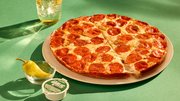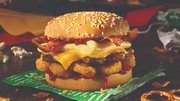Article
QSR stocks beating Dow
While stocks have taken a hit, the segment is faring better than the industry as a whole.

December 8, 2008
Compared with the state of the overall economy, the financial position of quick-service restaurant operators is relatively strong. Although QSR stocks have taken a hit in recent months, on average they're doing better than the market as a whole.
People still need to eat, it seems, and quite a few of them are choosing to do so at quick-service restaurants.
"The QSR segment is well positioned to withstand the current economic conditions because of its value perception, lower priced menu items, and a continuing consumer trade-down from full-service dining," according to a report issued by international ratings agency the Fitch Group.
The Dow Jones Industrial Average closed at 8,934 on Monday, off 46 percent from a high of 13,508 on May 2. The Dow hit a low of 7,552 on Nov. 20.
QSR stocks have fared better than the Dow, however. The stock of Burger King Holdings, which operates more than 11,500 restaurants, closed at $21.35 per share Monday, off 28 percent from $29.60 at the beginning of August.
Despite the drop in Burger King's stock price, analysts at Citigroup initiated a "buy" rating for the company's stock on Dec. 5.
CKE, parent of the Hardee's and Carl's Jr. brands, has seen its stock fall 40 percent to a Monday close of $8.78, off from $13.88 at the beginning of September. The stock hit a low of $4.88 just before Thanksgiving.
Analysts at Sun Trust upgraded CKE's stock from "neutral" to "buy" on Nov. 26.
And McDonald's has barely noticed the economic turmoil, it seems. McDonald's stock fell to a low of $51.55 in the first week of October, but has recovered over the past month. On Monday, the stock closed at $60.92, off from its early August high of $65.95.
In mid-November, analysts at financial services firm UBS upgraded McDonald's stock from "neutral" to "buy."
Comps hold steady
Much of the strength in QSR stocks has come from the fact that while consumers have been spending less overall, they're spending more on fast food.
In its most recent earnings release, on Oct. 31, Burger King reported that its worldwide comparable-store sales were up 3.6 percent for its most recent quarter, the 19th consecutive quarter of positive comps.
CKE reported last month that comps for its brands were up 1 percent for the four-week period ended Nov. 3. Comps were up 2.1 percent at the company's Hardee's brand and were flat for Carl's Jr.
CKE's comps are up 1.6 percent year-to-date.
And on Dec. 8 McDonald's reported a 7.7 percent increase in its global same-store sales for November. U.S. comps were up 4.5 percent.
Commodities taking their toll
Despite benefiting from increased customer traffic thanks to the weak economy, the news isn't all good for QSR operators. One factor that may influence stock prices next year is the price of commodities. Many operators have been hit by rising commodity costs, especially for fast-food staples like beef and potatoes.
| ||||||||||||||||||
According to Fitch, the U.S. Department of Agriculture is projecting an increase in chicken prices due to reduced industry production, and beef costs are forecast to remain high due to continuing low supplies.
Beef costs were up 18 percent in the third quarter of 2008 for Jack in the Box, according to officials from that company. That company's stock closed at $20.49 on Monday, off from an Aug. 14 high of $26.84 but up from a Nov. 20 low of $12.27.
"Beef is our single largest food cost, accounting for nearly 20 percent of our spend," said Jerry Rebel, chief financial officer of Jack in the Box, in a Nov. 19 conference call with investors.
"Shortening was up almost 60 percent and potatoes were up 8 percent," he said. "Combined, these commodities contributed to a 7 percent increase in overall food costs for the quarter."
 ChatGPT
ChatGPT Grok
Grok Perplexity
Perplexity Claude
Claude









